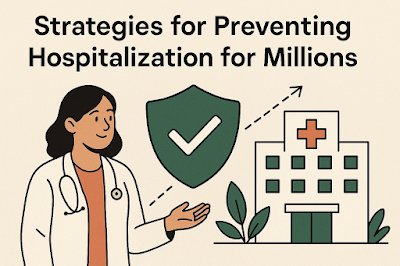GPs Will Work More Closely With Specialists to Support Patients Closer to Home, the Government Says
Meta Description: Explore how the UK government is enhancing healthcare delivery by integrating General Practitioners with specialists to support patients closer to home. Understand the implications, benefits, and future of this initiative.
The New Vision for Healthcare: Collaborating for Better Patient Outcomes
Understanding the Initiative's Background
In a groundbreaking announcement, the UK government has indicated a transformative shift in healthcare delivery, where General Practitioners (GPs) will increasingly collaborate with specialists to ensure patients receive comprehensive care closer to their homes. This initiative comes amid a backdrop of rising healthcare demands, especially post-pandemic, where the importance of accessible healthcare has never been more pronounced.
The concept is simple yet revolutionary. Instead of patients traveling long distances to receive specialized treatments or consultations, the collaboration between GPs and specialists aims to bring these services to local communities. This model not only enhances the continuity of care but also acknowledges the fact that many patients, particularly those with chronic illnesses or mobility issues, can find it challenging to travel for medical appointments.
Why This Approach Matters
The rationale for this closer collaboration is rooted firmly in improving patient outcomes. By bridging the gap between primary care and specialized services, the government aims to mitigate several longstanding issues within the healthcare system:
- Accessibility: Patients will no longer need to navigate through lengthy waiting lists for specialist consultations exacerbated by logistical hurdles. Increased access to specialized care in local settings can lead to timely interventions.
- Continuity of Care: This collaborative practice fosters a more seamless healthcare experience where GPs remain informed about their patients' specialized care plans, enabling better monitoring and management of health conditions.
- Holistic Treatment: With GPs working in tandem with specialists, treatment plans can be more comprehensive, taking into account the entirety of a patient's health rather than fragmented pieces from disparate healthcare providers.
Implementing the Change: A Close Look at Strategy and Logistics
Coordinating Care Teams
One of the central facets of this initiative focuses on the formation of Integrated Care Teams (ICTs). These teams, comprising GPs, specialists, nurses, and other healthcare professionals, are designed to provide coordinated care tailored to individual patient needs. The COVID-19 pandemic highlighted the necessity for such integrated approaches; hence, this initiative builds on the lessons learned during emergency healthcare provision.
As this strategy unfolds, careful attention will be paid to developing standardized protocols for communication and care delivery between GPs and specialists. This may involve shared digital platforms for patient records, where both parties can quickly access and contribute to a patient's clinical data.
Training and Support for GPs
To ensure the success of this integration, GPs will receive training on collaborative care practices. Continuing education will include modules on navigating relationships with referral specialists, understanding the complexities of specialized procedures, and efficient patient management strategies. As GPs grow more versed in specialty care modalities, their confidence and capability in managing a broader range of health concerns will expand.
Benefits Beyond Patient Care
Enhancing the Doctor-Patient Relationship
The integration of GPs and specialists allows for a more well-rounded approach to patient interactions. With GPs acting as the first point of contact and often the main source of ongoing care, the increased presence of specialists within local health systems will encourage patients to engage more proactively with their health management.
When patients see their GPs working closely with specialists, it lends credibility to the care they receive—patients are likely to feel validated, understood, and supported, fostering a relationship built on trust. This emotional connection ultimately translates into better adherence to treatment plans and improved health outcomes.
Alleviating Pressure on Emergency Services
A significant benefit of this collaborative approach is the potential reduction in pressure on emergency rooms. By providing patients with timely access to specialist care at the primary care level, the need for emergency interventions could decrease substantially. This shift not only ensures that emergency services are utilized appropriately but also enhances the overall healthcare infrastructure's efficiency.
Conclusion: Looking Ahead—A Call to Action
The government's initiative to have GPs work more closely with specialists represents a major step towards a more integrated, accessible, and effective healthcare system. As communities embrace this model, it's crucial for patients, healthcare providers, and policymakers to engage actively in discussions about the implications of these changes.
By understanding the importance of this initiative and getting involved in their local healthcare systems, patients can advocate for themselves and others. Whether through attending community workshops about healthcare changes or simply discussing options with their GPs, your involvement can make a difference.
Hashtags for Social Sharing
#HealthcareIntegration #GPsAndSpecialists #PatientCare #LocalHealthcare #HealthAwareness #CommunityHealth #UKHealthcare
FAQ Section
1. What is the main goal of the new initiative where GPs work with specialists?
The primary goal is to enhance patient care by providing specialized healthcare services within local communities, allowing patients to receive comprehensive treatment without needing to travel long distances.
2. How will this integration impact my healthcare experience?
This change is expected to make your healthcare experience more seamless and personal. You'll likely notice improved access to specialist consultations through your GP, leading to timely treatments and a more cohesive healthcare journey.
3. Are there any concerns associated with GPs collaborating with specialists?
While collaboration presents numerous benefits, some concerns include ensuring effective communication and maintaining patient privacy. However, with the establishment of Integrated Care Teams and proper training, these challenges are being addressed proactively.
Feel free to ask your GP about this initiative during your next visit and engage in the ongoing discussions to support its successful implementation!

